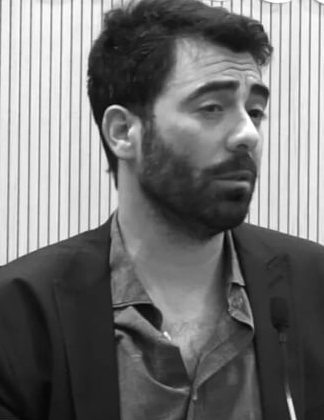|
|
philosophical
return to
THE GREAT OUTDOORS

by
SANTIAGO ZABALA
___________________________________
Santiago
Zabala is
ICREA Research Professor of Philosophy at the University of
Barcelona. His books include The Hermeneutic Nature of
Analytic Philosophy (2008), The Remains of Being
(2009) and Hermeneutic Communism (2011, coauthored
with G. Vattimo), all published by Columbia University Press.
His most recent book is
Why Only Art Can Save Us. (2017)
According
to certain journals, series and blogs, there is a new philosophical
movement called “speculative” or “new realism.”
The main players are young European philosophers such as Quentin
Meillassoux and Markus Gabriel, among others. They claim,
against idealism, phenomenology and hermeneutics, that we
can have access to primary qualities of the world as it is
in itself without being dependent upon language or interpretation.
They call for a return to “the Great Outdoors”
(“le Grand Dehors”), which is constituted
of independent objects — that is, of “a reality
never exhausted by any relation to it by humans or other entities,”
as Graham Harman explains. According to these thinkers, we
have been imprisoned for too long by the linguistic turn and
the conflict of interpretations, which holds that everything
that exists is only the correlate of a subject that conceives
it. Linguistic-turn philosophy has denied thought any rational
access to things in themselves, allowing unfounded discourses
on works of art, religious beliefs, and even animals to gain
prominence. Against these aesthetic, theological, and animal
studies, the “new realists” think we ought to
return to the absolute, which they understand as physical
reality. They call for, in other words, a “reality”
independent of us, one that only mathematics can explain,
even though, as Slavoj Zizek says, every “field of ‘reality’
(every ‘world’) is always already enframed, seen
through an invisible frame.” Although this return to
reality is useful when it comes to telling us whether it’s
raining or snowing — something we can know without the
aid of mathematics — can it also guide our individual
or social existence?
We are not
interested in evaluating whether these philosophers are
actually doing something new, which in philosophy is always
suspicious, but rather, we want to know what lies behind
their theoretical approach. It is curious, as Simon Critchley
rightly pointed out, that just “when a certain strand
of Anglo-American philosophy (think of John McDowell or
Robert Brandom) is making domestic the insights of Kant,
Hegel and Heidegger and even allowing philosophers to flirt
with forms of idealism, the latest development in Continental
philosophy is seeking to return to a Cartesian realism that
was believed to be dead and buried.” Although these
new philosophers justify their theoretical beliefs in different
ways, often from a mathematical point of view so as to demonstrate
— despite Thomas Kuhn — the supposed stability
of a scientific (in particular physics) understanding of
the world, we believe their work is part of a global call
to order and to behave accordingly. All this is not very
different, as Arthur C. Danto recalls, from “what
in France was called after World War I rappel à
l’ordre — a call to order — in which
avant-garde artists were enjoined to put aside their experiments
and represent the world in ways reassuring to those whose
worlds had been torn apart by war.” But what does
this order refer to in the 21st century after the end of
communism, ideology, and also history?
This order,
contrary to what we might expect at first, does not refer
to a reality that must be respected or imposed, but rather
to the absence of events and emergencies which seems to
constitute the condition of our globalized world. Although
everyday life and newspapers are full of “events”
and “emergencies,” the dominant impression of
citizens in industrialized countries, whether at their centers
or in their post-colonial slums, is that nothing new happens
anymore: Reality is fixed and stable. Unlike Carl Schmitt
and Giorgio Agamben’s “state of exception,”
in which a sovereign decides everything, the absence of
emergency is a consequence of a world, in which politics,
finance, and culture have been framed within previously
established parameters. The problem is not simply that these
parameters have been previously agreed upon, but rather
that they are meant to rescue us from emergencies, from
whatever emerges as different. This excluded difference
includes alternative political initiatives such as the Occupy
movement, global financial reforms like the ones Thomas
Piketty demands, or the survival of humanities programs
in colleges and universities. Perhaps citizens’ participation
in democratic elections, governments’ calls to end
ECB austerity policies, or intellectuals’ involvement
in the public sphere, are all declining throughout Europe
because a general resignation dominates, one that remains
undisturbed even when there is an economic crisis like the
one that we are experiencing now. But how should we respond
to this condition if not by emphasizing reality?
The new realist
“object-oriented ontology” asks us to accept
and behave accordingly to this absence of emergency. After
all, once we accept that the world as it is in itself is
the same as the world should be for us, then we will grant
mathematics and physics the task of providing a correct
ontology of nature. In this way, whoever does not submit
to the ongoing absence of emergency is mistaken, or worse,
on the wrong side of reality — maybe even the wrong
side of the border. This would not simply include philosophy,
but also other disciplines such as sociology, psychology,
and economics, which only began and are dependent upon its
observers, interpreters and communities. And it is precisely
these communities which are lost as soon as we return and
submit to reality. This is why, instead of tightening the
social order that accompanies reality’s absence of
emergencies, it is necessary to weaken this order further
because “the only emergency,” as Heidegger once
said, “is the absence of emergency.”
READER FEEDBACK
|
|
|